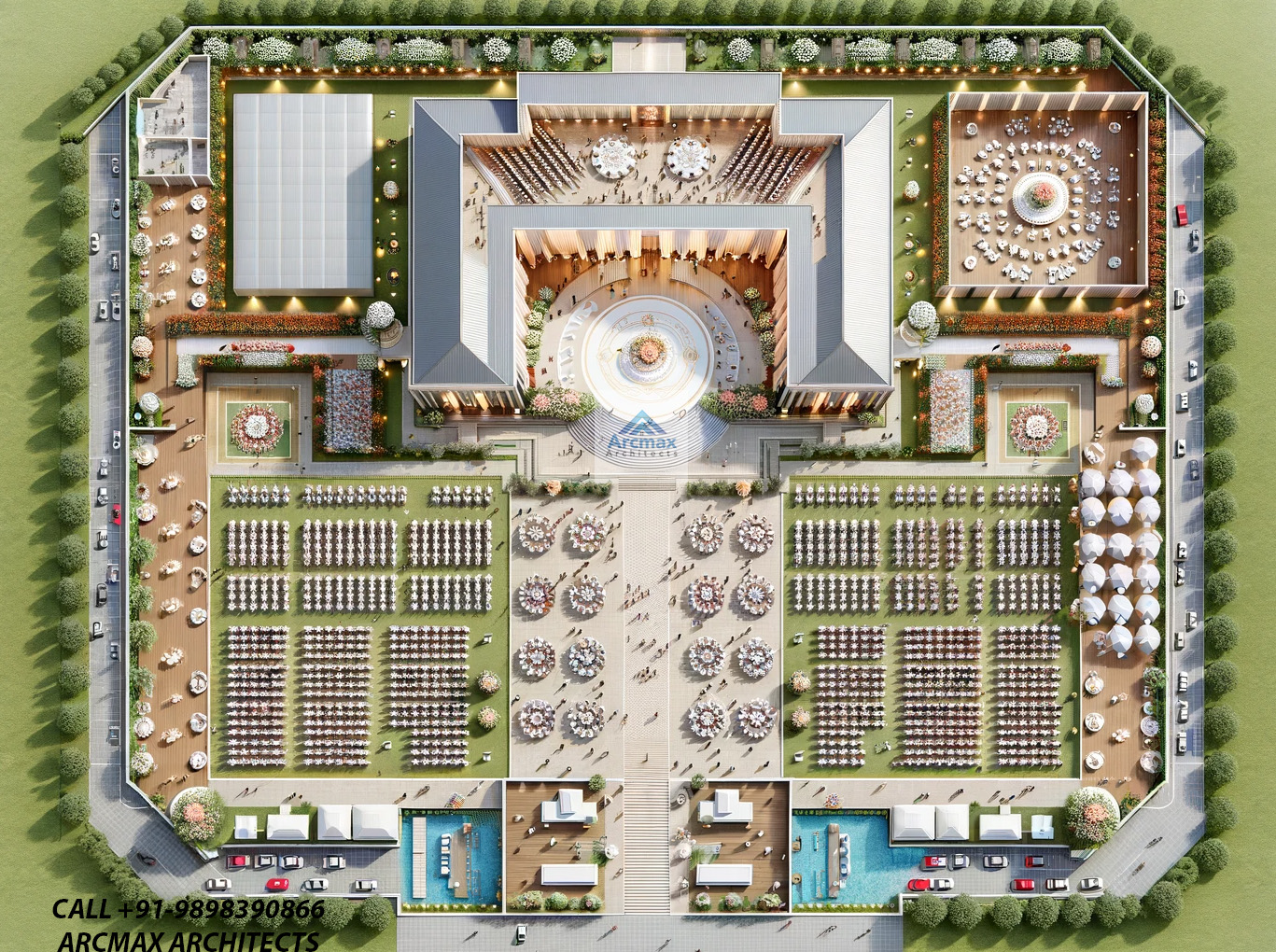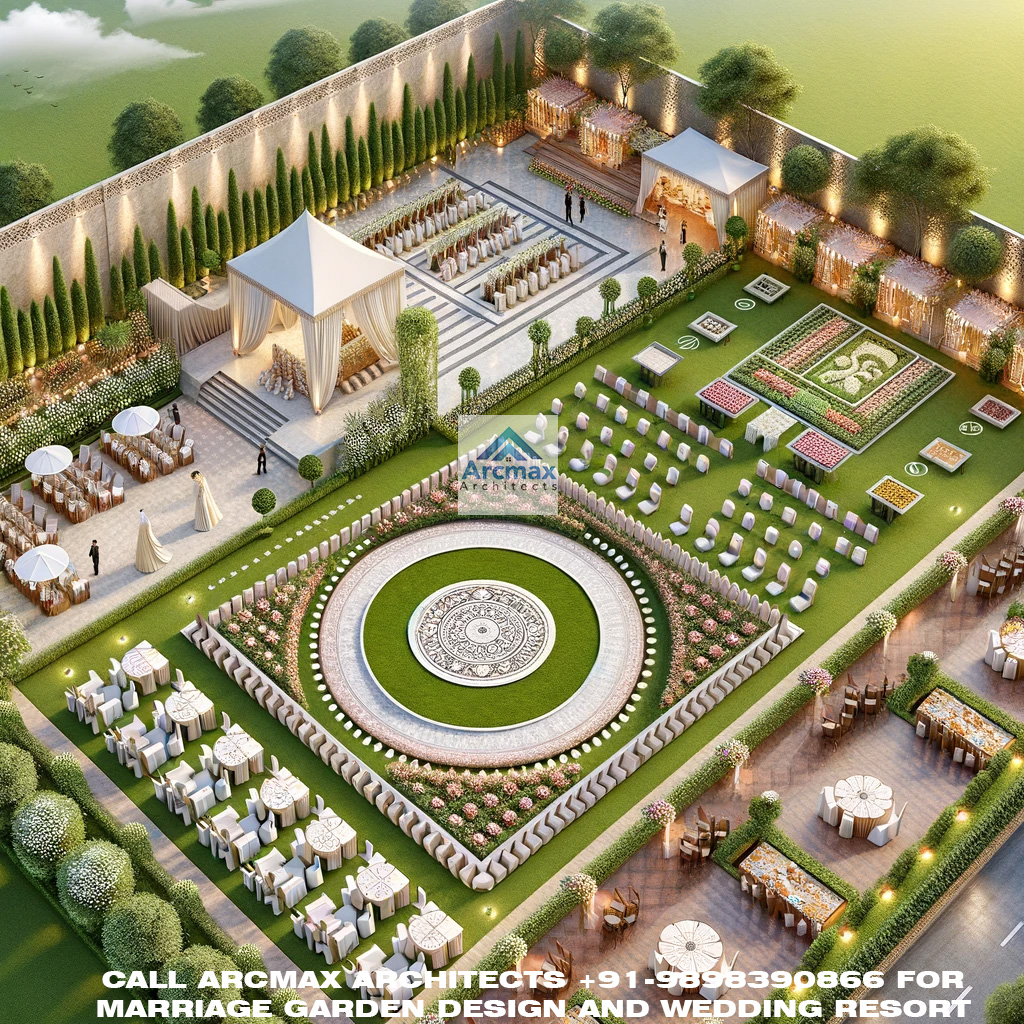
Looking for Marriage Garden design Plans in India ? Hire Arcmax Architects Today for marriage garden design and planning / destination wedding resort design anywhere in India or call +91-9898390866
Creating a comprehensive guide on marriage garden design and plans in the Indian context requires careful consideration of various cultural, aesthetic, and practical elements. Indian weddings are vibrant, elaborate affairs that celebrate not just the union of two individuals but also the coming together of two families. These events are characterized by a rich tapestry of rituals, colors, and festivities, making the design and planning of a marriage garden a crucial aspect of wedding preparation.
Introduction
Marriage gardens play a pivotal role in Indian weddings, serving as the venue for a myriad of vibrant ceremonies and rituals. These spaces are not just about aesthetics; they embody the cultural, social, and spiritual fabric of Indian matrimonial celebrations. A well-designed marriage garden combines beauty, functionality, and cultural elements, creating an unforgettable ambiance for the bride, groom, and their guests. This guide aims to delve into the essentials of marriage garden design and planning in the Indian context, highlighting the integration of traditional values with contemporary needs to craft spaces that celebrate love and union in the most beautiful way.
Understanding Indian Wedding Requirements:
Indian weddings are grand, colorful, and diverse, often extending over several days with multiple ceremonies and rituals. A marriage garden must cater to this diversity and scale, accommodating events like the Mehendi, Sangeet, and the main wedding ceremony. Central to the design is the Mandap, a sacred space where the wedding rituals are performed, which needs to be visually stunning and appropriately positioned. Additionally, the garden should have a spacious dining area, a dance floor, and ample seating arrangements to ensure comfort for guests. Understanding these requirements is crucial for creating a space that is both functional and celebratory, reflecting the joy and sanctity of the occasion.
Design Principles for Marriage Gardens:
Designing a marriage garden in the Indian context involves balancing aesthetics with functionality while respecting cultural traditions. The key principles to consider include:
-
Aesthetics: The visual appeal of a marriage garden sets the tone for the wedding. Traditional elements like arches, fountains, and statues can be blended with modern designs to create a timeless space. Landscaping plays a crucial role, with flower beds, ornamental plants, and themed gardens adding color and vibrancy. Lighting should highlight these features, creating a magical atmosphere as the evening progresses.
-
Functionality: The layout of the marriage garden must facilitate smooth flow of guests between different areas — from the entrance to the Mandap, dining area, and other ceremonial spaces. Accessibility is paramount, ensuring that guests of all ages can move around easily. The design should also incorporate practical needs for catering services, restroom facilities, and backstage areas for performers or event staff.
-
Sustainability: With growing awareness of environmental issues, sustainable practices in garden design are increasingly important. This can include the use of solar-powered lights, water recycling systems for landscaping, and the selection of local plant species that require less water. The aim is to minimize the environmental footprint of the event while maintaining the garden's beauty and functionality.
Cultural Elements in Garden Design:
Incorporating cultural elements into the design of a marriage garden adds depth and authenticity to Indian weddings. Traditional motifs such as lotus flowers, peacocks, and auspicious symbols can be integrated into decorations, walkways, and the Mandap design. Color plays a significant role, with reds, golds, and saffron reflecting prosperity, purity, and auspiciousness. These elements are not just decorative but are imbued with meaning and significance, resonating with the spiritual and emotional aspects of the wedding.
Natural elements are also integral to Indian weddings, symbolizing life and growth. Water features like ponds or fountains, along with abundant floral decorations, create a sense of abundance and fertility. The use of marigolds, roses, and jasmine not only beautifies the space but also fills the air with fragrance, enhancing the sensory experience of the event.
Practical Considerations:
Practicality is key in ensuring that the beauty of a marriage garden translates into a comfortable and enjoyable experience for guests. Weatherproofing is essential, with provisions for unexpected rain or extreme heat, such as retractable roofs or air-cooled tents. Lighting needs to be both functional and decorative, illuminating paths for safety while creating an enchanting ambiance. LED lights and lanterns can be used to highlight architectural features and landscapes without overwhelming the natural beauty of the garden.
Sound management is another critical aspect, particularly in residential areas. Soundproofing techniques and strategic speaker placement ensure that music and announcements are clear without causing disturbance. Finally, considering the scale of Indian weddings, efficient waste management and recycling systems are vital to maintain cleanliness and sustainability.
Conclusion:
Designing a marriage garden for an Indian wedding is a multifaceted endeavor that blends aesthetics, functionality, and cultural significance. A well-planned garden becomes more than just a venue; it transforms into a vibrant stage that celebrates the joyous union of two lives, creating memories that last a lifetime.



